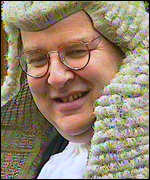 Quite right, too! A written constitution would be a disaster for the British people. We'd be arguing over it like ferrets in a sack. Those that think it OK forget that our freedoms have been gained by the state being unable to have any central control. What it does have is sovereignty which resides only at the centre of the state. The Crown, Parliament, and the Church were deemed to be "estates" with the fourth estate being the Press, unofficially! We have our Norman forebears to be thankful for laying down a system that works. Any fundamental change, as the former Archbishop of York, Lord Habgood, said, "was like undoing your aunt's knitting. One loose stitch and the whole lot unravels". Ancien Régime, thank you indeed!
Quite right, too! A written constitution would be a disaster for the British people. We'd be arguing over it like ferrets in a sack. Those that think it OK forget that our freedoms have been gained by the state being unable to have any central control. What it does have is sovereignty which resides only at the centre of the state. The Crown, Parliament, and the Church were deemed to be "estates" with the fourth estate being the Press, unofficially! We have our Norman forebears to be thankful for laying down a system that works. Any fundamental change, as the former Archbishop of York, Lord Habgood, said, "was like undoing your aunt's knitting. One loose stitch and the whole lot unravels". Ancien Régime, thank you indeed!
Yes, I know that people, including myself, think the last 9 years a tad overwhelming, and there is a clamour for "rights" etc, but I would urge a return to cabinet government, a return to responsibilities being carried out with good grace, and a return to representative democracy in Parliament and the shires. Those countries with a written constitution are still squabbling over the interpretation. Also, what is written down may include an entrenchment clause making certain amendments either more difficult than others or impossible. It may even require some form of supermajority, a referendum or the consent of some other party if it is allowed at all. Hurdles to jump. With the British constitution, all sovereignty ultimately belongs to Parliament, so the concept of entrenchment cannot exist.
Parliament is a High Court itself. Our representatives should make the law, the judges should interpret the law. A written constitution would forever bind the legislature in, and, as Lord Falconer says, the judges would "decide issues like should people be able to have abortions, to what extent is discrimination allowed, to what extent are certain punishments in prison allowed."
Lord Falconer is beginning to regain his legal sensibilities at long last, so cruelly put to the test through a misplaced loyalty to spin and subterfuge. By knocking back Gordon Brown's idea of a written constitution, he is doing us all a favour!
Bring on this heavyweight, for goodness sake!
What the PM should see and talk about in China
-
When in China the PM is well placed to do something about the big increase
in world CO 2 as a third of the CO 2 and much of the growth in CO 2 comes
from C...
22 hours ago






.jpg)






1 comments:
Although, can I just point out that the highest law in the land (next to the Queen of course) is the unelected Lord Chancellor of England, Lord Falconer himself. Genuine concern or just worried about losing his power and influence?
Post a Comment